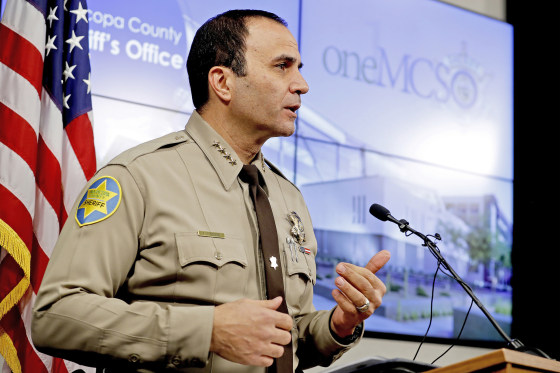Traffic stops of Latino drivers by the sheriff’s office in metro Phoenix were more likely to last longer and result in searches or arrests than those of white drivers, according to a new study eight years after the agency was found to have racially profiled Latinos in immigration crackdowns.
The report released Tuesday echoes some of the same conclusions from past traffic enforcement studies aimed at identifying signs of racial bias in stops by Maricopa County Sheriff Paul Penzone’s office. The agency is required to produce the reports as one of the remedies to a 2013 verdict that found officers profiled Hispanics in then-Sheriff Joe Arpaio’s traffic patrols that targeted immigrants.
Though the study doesn’t conclude officers are still profiling Latinos, it said the enforcement disparities are concerning “because they identify possible systematic racial bias and its effect on our community.”
In a statement, Penzone said his office will continue working “on methods to mitigate the disparate outcomes in our patrol function, as well as root out racial bias, where it exists. I remain committed to ethical, constitutional policing practices at the Maricopa County Sheriff’s Office.”
Raul Piña, who serves on a community advisory board set up to help improve trust in the sheriff’s office, criticized the report for what he said was a reliance on euphemisms to describe discriminatory policing, rather than squarely calling it racial profiling.
“It’s a horrific problem if you are a Hispanic driver,” Piña said. “It’s a disservice for them to continue picking it apart and playing verbal gymnastics and this PR campaign to try to clean this up when it’s impacting people’s lives.”
In response to the criticism, Penzone’s office said the study doesn’t evaluate the pre-stop behavior of officers, but rather is focused on patterns of deputy behavior after stops are made.
The study examined more than 20,000 traffic stops made by the sheriff’s office in 2020.
After the profiling verdict, a judge ordered the agency to retrain officers on making constitutional traffic stops, establish a warning system to identify problematic behavior by officers, equip deputies with body cameras and intervene with officers flagged for having statistical differences from their peers in how they have treated Latinos. The sheriff’s office also has incorporated lessons on implicit bias in its training curriculum.
Three months ago, the lawyers who won the profiling case complained that the agency stopped looking for deputy-level bias in traffic-stop data collected after June 2017 and hadn’t completed an intervention with a deputy to address indications of bias since early 2019.
Penzone’s office responded by saying a pilot program using traffic-stop data for officer interventions began in 2021. Penzone said none of the 17 bias complaint investigations his office completed for the one-year period ending on March 31 were sustained.
In another development in the profiling case, Penzone faces a Thursday deadline for saying whether he will contest a claim that he’s in contempt of court for noncompliance with a court-ordered overhaul of his agency’s internal affairs operation, which has a backlog of 1,800 cases, each taking an average of 500 days to complete.
Arpaio, who served six terms as sheriff and is running for his old job again this year, conducted traffic patrols targeting immigrants from January 2008 until the spring of 2013. His refusal to stop the patrols led to his criminal contempt of court conviction, though he was spared a possible jail sentence when he was pardoned by then-President Donald Trump.
The compliance and legal costs for taxpayers in metro Phoenix from the profiling case are expected to reach $202 million by the summer of 2022.
Follow NBC Latino on Facebook, Twitter and Instagram.

